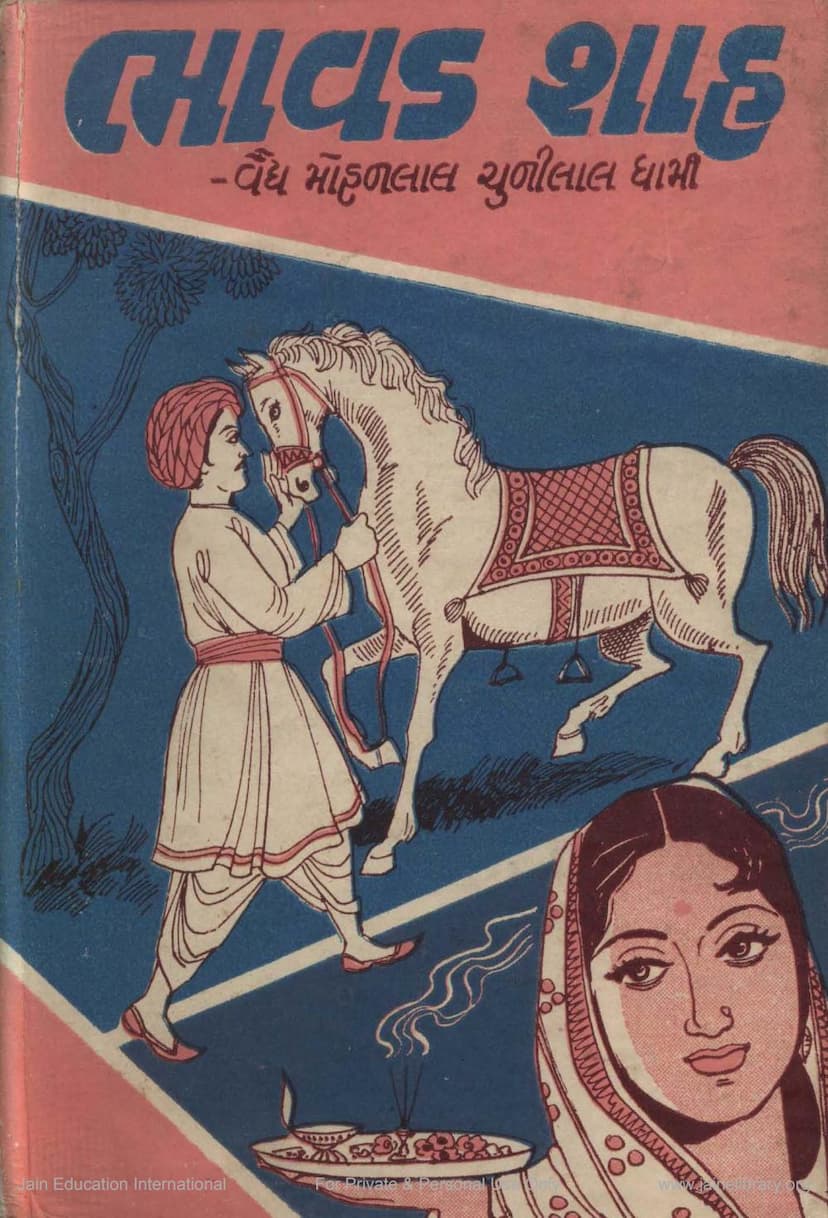Bhavad Shah
Added to library: September 1, 2025

Summary
Here's a comprehensive summary of the Jain text "Bhavad Shah," authored by Mohanlal C Dhami:
Overview:
"Bhavad Shah" is a historical novel that delves into the life of Bhavad Shah, a prosperous Jain merchant in ancient Saurashtra during the era of Emperor Veer Vikram. The novel intricately weaves together themes of integrity, faith, resilience, and the importance of ethical conduct in the face of adversity. It highlights the spiritual and moral values deeply embedded in Jain traditions and their impact on an individual's life journey.
Setting and Historical Context:
The story is set in ancient Saurashtra, particularly in the city of Madhumati Nagari (now Mahuva), which was under the dominion of Emperor Veer Vikram. This period is depicted as a golden age characterized by prosperity, strong moral values, and a flourishing trade. The novel emphasizes the high reputation of Indian merchants, particularly the Jains, who were known for their honesty and adherence to their faith even in challenging times. The narrative also touches upon the advanced state of education and various fields of knowledge during this era.
The Protagonist: Bhavad Shah
Bhavad Shah is portrayed as a young, intelligent, capable, and devout Jain merchant. Despite facing immense financial loss due to a shipwreck that destroyed his twelve ships, he demonstrates unwavering integrity and adherence to his principles. Rather than succumbing to despair or compromising his ethics, Bhavad Shah chooses to repay all his debts meticulously, even if it means selling all his assets and living a life of simplicity. His unwavering faith in Jain principles and his commitment to honesty are the cornerstones of his character.
Key Themes and Plot Points:
- Integrity and Honesty: Bhavad Shah's refusal to compromise his integrity, even when faced with extreme poverty, is a central theme. He prioritizes his reputation and ethical commitments over material wealth.
- Faith and Resilience: The novel showcases Bhavad Shah's strong faith in Jainism and its teachings. This faith provides him with the inner strength to face immense challenges and remain steadfast in his principles.
- Adversity and Rebuilding: After losing his fortune, Bhavad Shah, with the support of his virtuous wife, Bhagyamati, rebuilds his life from scratch through honest labor, starting with a small cloth business.
- The Role of Family and Relationships: The novel highlights the importance of a supportive family, particularly the strength derived from Bhagyamati, Bhavad's devoted wife. The narrative also explores the complexities of family relationships, as seen through the contrast between Bhavad's supportive sister, Suraj, and her materialistic and less virtuous husband, Malukchand.
- The Influence of Faith and Spiritual Practices: Bhavad and Bhagyamati's consistent adherence to their daily religious practices (Samayika, Jin-puja, Pratikraman) are depicted as sources of their inner strength and peace amidst turmoil.
- The Trap of Greed and Materialism: The character of Malukchand, Bhavad's brother-in-law, serves as a foil, representing greed and a lack of spiritual understanding. His miserliness and focus on wealth accumulation are contrasted with Bhavad's emphasis on ethical living and detachment.
- The Power of Forgiveness and Goodness: Bhavad's ability to forgive and offer help even to those who wronged him, like Shyam Singh (the King's brother-in-law), demonstrates his magnanimous nature.
- The Divine Intervention and Karma: The narrative suggests that unwavering faith and righteous conduct ultimately attract divine favor and contribute to the turning of fortunes. The blessings of Yati Dada and the arrival of the auspicious horse "Lakshmi" can be seen as manifestations of this principle.
- The Triumph of Virtue: The story culminates in Bhavad Shah's return to prosperity and respect, not by compromising his values, but through his perseverance, integrity, and adherence to dharma. His commitment to rebuilding his life through honest means ultimately leads to his success and the well-being of his family and community.
Key Characters:
- Bhavad Shah: The protagonist, a pious, honest, and resilient Jain merchant.
- Bhagyamati: Bhavad's virtuous, supportive, and devoted wife.
- Raghav: A loyal and supportive farmer, Bhavad's trusted friend.
- Narayan Pandit: Bhavad's learned friend, who pursues higher knowledge.
- Dharmadas: Bhavad's business associate and childhood friend.
- Shyam Singh: The King's corrupt brother-in-law, who attempts to harm Bhavad and Bhagyamati.
- Jamini: Shyam Singh's accomplice, who tries to trap Bhagyamati.
- Malukchand: Bhavad's brother-in-law, who is greedy and materialistic.
- Suraj: Bhavad's sister, who is kind-hearted but unable to help her brother due to her circumstances.
- Yati Dada: A spiritual guide whose blessings and advice play a significant role.
- King Tapanraj: The ruler of Kapilvastu.
- Emperor Veer Vikram: The benevolent sovereign who governs the land.
- Shivu Dada: A wise physician who helps Bhavad recover from his injury.
Narrative Structure and Tone:
The novel is structured to unfold Bhavad Shah's life chronologically, highlighting key events and challenges. The tone is generally inspirational and didactic, emphasizing the moral and spiritual lessons derived from Bhavad's experiences. The author, Mohanlal C Dhami, a renowned Ayurvedic physician, imbues the narrative with a deep understanding of human nature and a strong moral compass, reflecting the values of Jainism.
Conclusion:
"Bhavad Shah" is more than just a story of a merchant; it is a testament to the enduring power of faith, integrity, and ethical conduct. It illustrates that true prosperity lies not just in wealth but in the steadfast adherence to one's principles, even in the face of overwhelming adversity. The novel serves as an inspiring narrative for readers, reinforcing the belief that righteousness and virtue ultimately pave the way for lasting happiness and fulfillment.